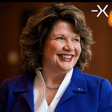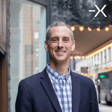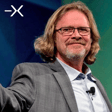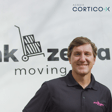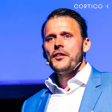Become a Creator today!Start creating today - Share your story with the world!
Start for free
00:00:00
00:00:01

Building trust in a broken system, with Jeff Logan & Robyn Gilson
Everyone knows the US healthcare system is broken. That shouldn't be an excuse for healthcare providers to not do everything in their power to improve the lives of their patients and their caregivers.
To explore how to build trust in a broken healthcare system, Will is joined by Robyn Gilson, VP at Acquis Cortico-X, and Jeff Logan, VP of Patient and Market Experience at Providence, and winner of 'CX Leader of the Year' at the 2024 US Customer Experience Awards.
Get in touch with Acquis Cortico-X here.
Follow Acquis Cortico-X on LinkedIn here.
Transcript
Introduction to Aquas Cortico X and Podcast
00:00:00
Speaker
Aquas Cortico X is an experience-led transformation business that partners with clients and technology companies to drive digital acceleration. We are experience activists passionate about elevating everyday human experiences through the belief that what's best for people is what's best for an organization. Reach out to us for a chat. A link is in the show notes.
00:00:35
Speaker
Hello and welcome to Speaking from Experience from Aquas Cortico X, where we speak to the people with experience of experience. I'm Will Kingston. Despite approaching middle age, or being middle aged if you define the term less charitably, I still love South Park.
00:00:52
Speaker
In their most recent episode they delivered the best critique of the american healthcare system ever put on screen it starts with the kids entering the shiny pristine lobby of a health insurance company. When the slick sales person finds out that the boys are looking to file a claim he says oh you want money from us.
00:01:13
Speaker
before directing them away from their luxurious surrounds to a dingy backroom with an old fax machine and a sad loan claims manager. What follows is a glorious musical number navigating the American healthcare system where the kids go from specialist to insurer to hospital to another hospital and so on filling out paper forms and facing rejections at every turn. South Park is saying something that we all know. The system is broken.
00:01:42
Speaker
Questions that I'm interested in are if you're part of that system, how can you still be on the patient's side? How can you deliver great experiences in a failing environment? How can you build patient trust in a broken system?
Introduction of Guests: Robin Gilson and Jeff Logan
00:01:57
Speaker
To help me with those questions, I am delighted to be joined by Robin Gilson, VP at CorticoX and the leader of the firm's experience management practice, and Jeff Logan. Jeff is the Group VP of Patient and Market Experience at Providence. He has led one of the great experience-led transformation stories in modern American healthcare.
00:02:17
Speaker
which was recently recognized at the US Customer Experience Awards, where Providence won two silver and three gold awards. The gold awards being for Best Business Change and Transformation, the best case study of putting customers at the heart of everything, and quite deservedly, an individual nod for Jeff as CX Leader of the Year. Jeff, Robin, welcome to Speaking from Experience. It's great to be here. Thank you for having us.
00:02:45
Speaker
I'll start with you Jeff and we'll go to that word trust that I used in the introduction.
Building Trust in Healthcare
00:02:51
Speaker
How do you think about trust in the context of healthcare? Yeah, I think trust is something that's often underlooked in healthcare. We believe at Providence and in talking with peers across the industry that trust is one of the most important metrics that you could have and the most important
00:03:11
Speaker
I'll say relational terms that you could build with customers is how do we build that longevity? How do we build that ongoing trust with the people we serve? People often trust their physician. They trust their doctor to give them the best possible care they could have. But many of those things outside of that specific delivery of care are eroding trust with healthcare.
00:03:39
Speaker
Think about the uncertainty of how much somebody is going to cost, how to get an appointment, what your bill means. Are you being charged fairly? All these other dynamics are eroding trust. So I personally believe that if healthcare were to think more broadly about how to build trust with our customers, with their families, with the communities we serve, we will be in a much better place in the United States in the world of healthcare.
00:04:09
Speaker
Robin you've been on this trust journey with us and me personally for a long time. What are your thoughts?
Mission-Driven Healthcare and Human Connection
00:04:16
Speaker
You know, I really think with trust You're saying like eroding it definitely can be broken. But when you do have it Doesn't mean everything has to be perfect, right? It's it's assuming that You're there You're human, you know, you're gonna be about my needs and I think that the beauty in health care is
00:04:39
Speaker
It's very mission driven and most people are there working in healthcare because they care. And so you've really got, when you were asking about getting to that point, I think it's everyone joining arms together to solve it, to solve the process and the technology challenges. But there's one thing that healthcare has going for it. It is, there's a lot of heart in healthcare and that hopefully will help weather this storm.
00:05:09
Speaker
I think you touched on a really important thing there, Robin, about it is human. I think the physician to patient relationship for the most part is human, but in the rest of people's experience with healthcare, it feels robotic. And I think that's really what part of our critical mission to change is at Providence and elsewhere.
00:05:37
Speaker
is how to bring humanity, the human experience to life through all of those touch points that our patients and their families have with the system. One of the ways that you would go about doing that is looking to transform your business around the customer, around people. I'm conscious that transformation is one of the more overused words in modern business.
00:06:03
Speaker
your approach has been around patient-led transformation. What does the concept of patient or experience-led transformation mean, Jeff? And how does that perhaps differ from transformation that is more technology focused or more focused around operations, for example? Yeah, I think that there's certainly not
00:06:28
Speaker
a void of opportunity for technology to play a significant role in transformation in healthcare, especially with things like AI and as we move into the next generation of what AI can do and technology can bring. But at the end of the day, we also have millions of caregivers across the United States, nurses, doctors, administrators, interacting with human beings at their most vulnerable point.
Enhancing Human Connections in Tech-Driven Healthcare
00:06:59
Speaker
in life. You're not going to the hospital the same way you're going to Disneyland, right? You're choosing to go to Disneyland and have a great vacation with your family. You're in the hospital because you need something that you cannot provide for yourself and you need an expert to be able to provide this for you. And the outcomes are uncertain.
00:07:19
Speaker
We've all lost people. We've all had people deal with diseases and accidents and cancer and the like. And when you're in those situations and your most vulnerable moment in life, you turn to healthcare providers to help provide you an outcome that is positive. And technology can alleviate a lot of the administrative barriers and help provide you education.
00:07:48
Speaker
and ease your way through the process. But the end of the day when you were in that heightened state of emotion and you are at your most vulnerable point, that human to human connection is incredibly important and could be life changing in all honesty. And so we're doing a lot to figure out how do we
00:08:10
Speaker
allow our human capital, our caregivers, our employees to operate at their most compassionate and top of license capability to create a framework to alleviate the administrative burden, to alleviate that administration,
00:08:29
Speaker
from the patient and their families through the use of technology to allow those human connections to build between a Providence brand and a patient and their families to create that lasting relationship, that trusted relationship that keeps them a part of Providence today and forevermore because we've made a meaningful impact in their lives in a good way. You can make a meaningful impact to people's lives in a bad way too,
00:08:58
Speaker
And that's not what we're trying to do. I think one unique aspect that stood out, you said patient led. Well, but to do patient led, it means being employee first, employee led.
Continuous Employee Engagement and Feedback Utilization
00:09:11
Speaker
And there's been a large investment at Providence in not just listening, but really getting in touch.
00:09:22
Speaker
with the front line and understanding what those needs are, what their observations are, what is their voice. They're the voice for the patient in many cases. And the answer lied with them. And that sure spurred a lot of change and leaders being very brave to listen and then act on what they heard.
00:09:46
Speaker
Robin, I've seen a lot of companies do an annual employee survey where you'll send something out. It'll be pretty token. You'll collect the insights. You'll then share it at an all hands and then nothing happens until next year. I'm guessing you think that's not good enough. How do you go about engaging with employees on a more consistent basis? Well, the annual at minimum is at least a start.
00:10:09
Speaker
You can't stop there, right? It's not, you know, what, what one of us has an experience with a brand and it's just one point in time, you know, it's a accumulation of experiences and touch points and you reflect based on those interactions. And so it's important to listen to people when they're in the grip, it's important to listen when they're at that point of celebration. And so if you're listening continuously,
00:10:37
Speaker
You're really going to uncover the themes and what matters and really be able to predict what's next. The unmet needs that you need to, you know, read between the lines and listen for. And so I'm a big advocate for, uh, I think I started out first where in my career, it was all about being relentless with the customer. And then it shifted in realizing that it always comes down to the people science and you've got to get in touch.
00:11:03
Speaker
and listen to the people and listen at all different levels and especially to your frontline. Jeff, you're now in a senior leadership role. You're thinking about highly strategic matters. How do you still make sure that you are connected with the frontline? You understand what they're going through. You feel what they are feeling despite your position in the organization. I think that is one of the hallmark failures of organizations that have
00:11:32
Speaker
customer facing products that don't succeed is that inability to understand what's happening at the front line. And I think, you know, it can be as complicated as you want it to be, or as simple as just going to where they're performing their work every day and spending time with them to understand what's going on.
00:11:53
Speaker
And I think we've done a fair amount to, we call it walk a mile in my shoes to build a systemic program where senior leaders can go and sit as a person in the hospital registering patients in the main admitting or the emergency department.
00:12:12
Speaker
or take phone calls from customers that are having a hard time paying their bills and helping to navigate the financial assistance solutions that are out there or scheduling. And so I think critically important is trying to be as empathetic as possible and spending and dedicating the time to what your frontline is going through on a daily basis.
00:12:37
Speaker
I think we've done a lot to play off of what Robin and you were talking about with the annual employee survey kind of thing, which kind of to me is like fake news to truly understand what our employees are going through on a daily basis. So we've done a lot of understanding of what the results of those surveys have told us. And we understood that a lot of it's based upon our caregivers, we call our employees caregivers,
00:13:07
Speaker
are not able to do their job to their maximum ability for a whole bunch of obstacles. And so we dug into that and started to listen to them on a daily, weekly, monthly basis of what are those obstacles that are preventing them from doing their job to the best of their ability. And we've subsequently spent a lot of time to remove those obstacles to keep them or to allow them to operate at the top of their capability.
00:13:37
Speaker
I don't know if there's a silver bullet to this other than spending time with the people that are doing the work and having your teams be responsible for spending time to do the work and to make that a priority of where you put your finite resources to resolve and to help optimize their ability to provide the best experience for our customers. I think I've always seen the magic
00:14:04
Speaker
and leaders light up when they see it, hear it, and feel it. And I think that that's what that enables, that you can read comment after comment. And I've seen leaders be committed via those annual surveys, which is important to reading the thousands and thousands of comments. But it's very different if I remember, and I still chuckle and laugh, that Jeff decided he was going to try and register a patient.
00:14:33
Speaker
and thought, for sure, today I'm going to do this. And then quickly realized he could not. And he could not navigate Epic. And he could push the patient in the hallway, but he could not register that patient. And many leaders went through that and the same outcome. And I think that it's also very different when your employees
00:14:58
Speaker
you know, you've got to find humor in the situation, right? They tell that story again and again. And I heard one of them even tell me how other leaders like Jeff doing this, trying to do a financial assistance application, just experiencing and rolling an epic sitting in their broken chair, realizing, you know, cold it was under their desks, where they wish they had bulletproof glass that them experiencing that
00:15:23
Speaker
made them see them in a different way and they realized, oh, they go get coffee too. They have kids that they're trying to meet for dinner. It broke walls down. They became human. And I think your point on trust is so key, right? You've got to have the trust there for them to open up and share those obstacles so that you can't even build trust with your customer.
00:15:43
Speaker
The word empathy comes to mind for me here because the role that you're just talking about is a really hard role. And compared to a CEO, it's not going to pay as hugely well. You're going to be on the phone a lot. That's really tough grueling stuff. And to see someone else go through what you go through and to have that shared sense that this is really hard and I get it and I feel it and I have empathy for what you're doing.
00:16:08
Speaker
That's powerful both for a senior leader, but it's also, it makes the other person, the person in that role feel appreciated as well, I imagine. What kind of programs we've seen our retention improve and our first year turnover improve. We have frontline caregivers through COVID and coming out of COVID and, you know, in the forefront of this medical crisis, turnover was in the high sixties and because of programs like this,
00:16:36
Speaker
that we've been able to bring it down into the low 40s, which is still high and we're still working on it, but it's a significant improvement because we are spending time as leaders understanding what they're going through on a daily basis and taking action on it. Because if we don't take action, then it's worse, generally speaking, than us not doing anything about it.
00:17:00
Speaker
I think you've hit on something really interesting here, Jeff, in that a lot of experienced leaders struggle to get traction in an organization because they're perceived as doing the warm and fluffy stuff. We create wow moments and we surprise and delight.
00:17:15
Speaker
and more hard-nosed people in the organization will go great, but are you actually delivering value? And so by tying it back to retention there, tying it back to a hard metric to say, this is actually how we are helping the organization in terms of dollars and cents, that's a really important story to tell. Robin, I'm conscious you've been in senior experience leadership roles yourself in banking, which is obviously very driven by the bottom line. How do you think about how experienced leaders can get buy-in in that way?
00:17:45
Speaker
I think you have to, one, leave with the empathy, but be ready to immediately tie it to the business impact and think ahead to, well, what do I need to solve? What problem and what is the ROI going to be? It's all got to be part of the prioritization equation. But to be honest, it's kind of like that saying you build it, it will come. I have not found one situation in 20 years where if you don't sit down with the people,
00:18:14
Speaker
and you learn and you truly listen both with your eyes and your ears, you're not going to find all that low hanging fruit in addition to the bigger opportunities for differentiation because the trust will build and they'll open up. And like Jeff was saying the retention, but there's many more projects that have been sparks that are initiated by people springboarding.
00:18:43
Speaker
from the feedback, connecting to what the patients are saying, they're living in and out and experiencing the unmet needs for customers. So that's why your answer lies there.
Empowering Caregivers with Strategic Framework
00:18:53
Speaker
Let's turn to another award that Providence picked up in those US Customer Experience Awards that I mentioned earlier, putting the customers at the heart of everything. Another one of those ones that can be a bit of a cliche, but it does speak to an important truth.
00:19:09
Speaker
Providence has made it very real and the way that they've done it is by empowering caregivers to the point that you made earlier, Jeff. What are some practical ways that you can go about, and Jeff, I'll take this to you. What are some practical ways that you can go about empowering caregivers to actually put the patient at the heart of everything? What are the tools that you can give them to be able to succeed in that task?
00:19:32
Speaker
Yeah, I think the first thing that we did on this journey was to, as we just talked about really, is to remove a lot of those obstacles that they had to do their job in the most meaningful way. But Providence is a fairly mission driven organization. Delivery of healthcare is very emotional, if you will. And people are drawn to it because they have a caring heart and want to provide a
00:19:59
Speaker
compassionate service to those in need in this space. It's very different from selling a widget. So I think to start, we have a compassionate workforce that wants to be part of healthcare, that wants to provide high level quality service. And so how do we eliminate those barriers to allow them to do that?
00:20:20
Speaker
I think the second thing is you can't just hire those people and hope that it goes well. You have to create kind of a strategic framework for how they're going to provide that kind of service. Healthcare can be very transactional in nature. I'm going to register you. I'm going to get your insurance, your name, your date of birth, your insurance card.
00:20:43
Speaker
maybe collected co-pay or co-insurance, and then usher you off to the next step in the process without spending the time to understand where maybe you will or you, Rob, and are in your kind of emotional and health journey as you're engaging with me as I'm doing those kind of more administrative tasks. So we did a lot of work to create what we call a cultural service and create a service framework.
00:21:10
Speaker
which is all tied to the mission of Providence and the values of what Providence is trying to deliver on a daily basis and care for all, especially the poor and vulnerable.
00:21:21
Speaker
And so how do we bring that to life in a consistent, repeatable way? No matter where you engage with us as a brand, whether it's one of our 51 hospitals, our staff on the phone, our over a thousand clinics, how do you know that you're getting that consistent, solid Providence experience in creating that
00:21:42
Speaker
That framework or if anybody's partnered with the Disney Institute, the dance floor, if you will, to kind of, you can dance however you want on the dance floor, but you have to dance on this dance floor with these parameters. It becomes very, very helpful to scale it amongst, you know, there are 5,000 people on our team delivering, delivering care in one way or another and 120,000 people to Providence doing the same.
00:22:11
Speaker
So how do you get everybody moving in the same direction as that solid framework? And then building a culture around it so that it's not just a training, it's not just an education program, but part of the DNA of what we do as people of Providence. Robin, you've been part of this. What would you add maybe? I think the beauty of it is, you know, you can say the word empowerment, but it's really bringing it to life because the dance floor
00:22:41
Speaker
It removed some of the fear. It allowed people to know the frame in which they could be, and they could clearly see because it was so simple how to carry that heart forward that they have at Providence. And then it created that, you know, consistency that becomes beautiful in a customer experience where it was delivered again and again.
00:23:08
Speaker
And so I think that you guys built trust and broke down so there wasn't that fear on being and acting on empowerment.
00:23:19
Speaker
I heard a lovely little example from a banking call center the other day to this end where they needed a policy to determine when call center agents could deliver refunds. And instead of basically putting a list of numbers and then a protocol in place for when you can do this and when you can do that, the policy was just use your common sense and then tap the person on the shoulder next to you and say, do you approve of this refund request?
00:23:46
Speaker
So you have the check there and it's coming from your peers that you can't do anything silly, but at the same time we're saying we trust you as a group to be able to make sensible decisions. And I thought that was a nice idea of having the dance floor there, but then giving them the ability to dance on that dance floor. It's a great example because it's the simplicity, right?
00:24:06
Speaker
Let's go to something we've touched on, and that is customer insights. Yet another award for Providence, best use of customer insights and feedback.
Project Esperanza: Hispanic Community Engagement
00:24:14
Speaker
And this was for Project Esperanza. Jeff, I'll start with you. What was Project Esperanza?
00:24:20
Speaker
Yeah, Esperanza means hope in Spanish. So I think it is named appropriately, but we've been on this journey to transition out of a one size fits all healthcare experience to become more relevant to the communities and the people we serve.
00:24:39
Speaker
I think that narrative is true through this entire conversation. But one of the areas that we really want to double down on is how do we serve our Hispanic communities in a more meaningful way? You think about issues with health equity, you think about the markets that we serve in today in Southern California, in Portland, in Seattle, heavy Hispanic population. And quite honestly, we are not doing a good enough job
00:25:08
Speaker
to provide meaningful, experiential care for that community. And so we want to double down and say, how do we help these people relate to Providence? How do we make them feel comfortable on this healthcare journey? How do we understand where they've come from and how they want to experience care?
00:25:31
Speaker
You started with listening to our customers, understanding what the population is struggling with, understanding what the Hispanic community has historically experienced in healthcare and what they're experiencing today.
00:25:44
Speaker
whether they're first or second or third generation into the United States, what they would bring from their previous experiences. And so we kicked off an initiative, and what I was so proud of of Providence is that it wasn't just my team. It was our physician network. It was our brand team. It was our health equity team. It was our marketing group.
00:26:09
Speaker
It was all of these teams saying, yes, this is the right thing to do for the people that we serve, our mission team. And so how do we come together to really make a meaningful impact for this community? And so not only is this about really transforming care for a community that was not being serviced appropriately, in my opinion,
00:26:33
Speaker
but also create a new way of working in Providence to bring these siloed organizations together to create meaningful change in an agile way. And so I could not be more proud of the team that's working on this, the outcomes we're seeing. We're not done. We have a lot to do still, but we've made meaningful progress and excited to have this group receive recognition for their efforts.
00:27:02
Speaker
Robyn, you've been intimately involved in that process. What have been your reflections? What surprised you about it? I don't think it would have been as successful as it was had the cross-functional leaders that came together being Jeff and brand and health equity and the clinic team.
00:27:23
Speaker
really ensuring the trust was there with those that were coming to the table from across different hospitals to design. Cause I got to observe and witness where, you know, it wasn't beautiful the whole way through and the group hit a roadblock and they felt that as they were approaching a shark tank that they needed to have all these, the silver bullets, these glitzy ideas, this how we define what innovation is, but innovation can also be the basics.
00:27:52
Speaker
And because the trust had formed and it was very clear it wasn't lip service, that it was about the caregiver's experience as employees, they opened up and shared their own personal stories of translating for their parents and what they've been going through, both as an employee trying to help those in their community, but also their own personal stories navigating for their family.
00:28:19
Speaker
And it was a real heartfelt moment and the leaders were all brave and said, you know, this doesn't have to be the next app. If we've got something broken and it's basic, we want you to tell us. You need to speak up and tell us. And it ended up being, you know, four to six ideas were requested and the group came up with more than 60. We were blown away. And I think it's because that door was opened
00:28:45
Speaker
And it was very clear, we want you to throw down all the things that are, we just have to do it. And they literally renamed just do it. And we will not lose sight of this, any of them in a backlog and we will act on this. And that commitment was there across the cross-functional leadership room. And I think that that was what surprised me. I mean, I knew and believed in these leaders, but it takes a lot of decisiveness in the moment.
00:29:14
Speaker
When you have the employees there on the edge of their seat and they haven't seen it before, they haven't felt it before. And they were sharing very, very personal stories that choked many of us up and realized it's time. It's time to do something. So that was my surprise. A pleasant surprise. You know, I know we're talking about a lot of really important and cool things here. I'd also want to give
00:29:41
Speaker
You guys at Aqua's Cortico X, a huge shout out.
CX Leadership and Collaborative Efforts
00:29:45
Speaker
It's truly a partnership that I've been blessed to be a part of. Thank you, Jeff. We feel blessed too.
00:29:52
Speaker
Our final question, Jeff, this goes to CX leadership. You very deservedly won CX leader of the year, beating out a stellar field. There will be a lot of people listening to this podcast who may be closer to the start of their CX transformation journey. CX leaders, and it's a tough role, right? Because it's not like a chief financial officer where it's a more clearly defined role or chief operating officer. You make your own journey as a customer leader.
00:30:17
Speaker
You're speaking to those people who are starting out on that journey. What advice would you give them? The heart of everything that we do in this field, the heart of everything I believe matters most is people. And so how do you figure out the way to care for your people? And for us, for me, it starts with my team. How do I care for my team the most? How do I provide them the best chance to succeed?
00:30:45
Speaker
How do I empower them as a leader to be successful as leaders themselves? My team is way smarter than me. They know way more than I know. They are experts at their craft. And my job is to allow them to be experts, let them bring their full self to what it is that they do every day. We put so much time and energy and thought into work.
00:31:14
Speaker
and to allow my team to be able to flourish has truly been the greatest joy of my professional career. But then as a CX professional, that's the start. And so then how do you provide that same mentality to the people that are interacting with your brand? So how do you bring your brand to life in a human way through those everyday interactions you have with your customers? So the core of it is don't forget
00:31:44
Speaker
people you serve, they're real human beings. Whether you're buying something, whether you're traveling, whether you're checking into a hotel or needing health care, it's a human being on the other side of that transaction. So don't forget that. That's first and foremost and most paramount in my mind to
00:32:06
Speaker
what brings success. And secondly, as I was articulating, probably not so well, is that it's about a team. It's not about you. It's not about you and what you can do. It's about your team and what you can collectively do. I think many people have played sports for a long time. There's not many mono e-mono sports. It's about a team. And how do you create a better outcome with a group of people
00:32:36
Speaker
than you could do on your own and building that trust and allowing them to do that. And then the third is probably my favorite, but probably the one that I get in the most trouble for is break some stuff. Let's break some things and see what happens. Let's push the boundaries. Let's, let's be comfortable being uncomfortable. And, you know, sometimes it's going to work. Sometimes you might get in trouble or what have you.
00:33:04
Speaker
But if you're focusing on the people, you're focusing on your team and you're breaking things to make things better for your team and the people you're serving, at the end of the day, it's going to be a better outcome. And as a leader, you have to be willing to withstand the pushback that's going to come from doing that. And so I guess the last thing is break some stuff and be brave doing it.
00:33:33
Speaker
And have a little bit of fun. Beautifully said. Jeff, Robin, I was not exaggerating when I said that the Providence story is one of the great modern experience transformation stories. And I think the magnitude of difficulty given that you are working in the healthcare space is, is a magnitude of 10. So what you both have been able to do is extraordinary.
00:33:54
Speaker
Congratulations on your success. Jeff, a particular congratulations on your recent award wins. Thank you both very much for your efforts in helping patients in proving Providence and thank you very much for coming on today. Thanks, Will. Thank you, Will.





